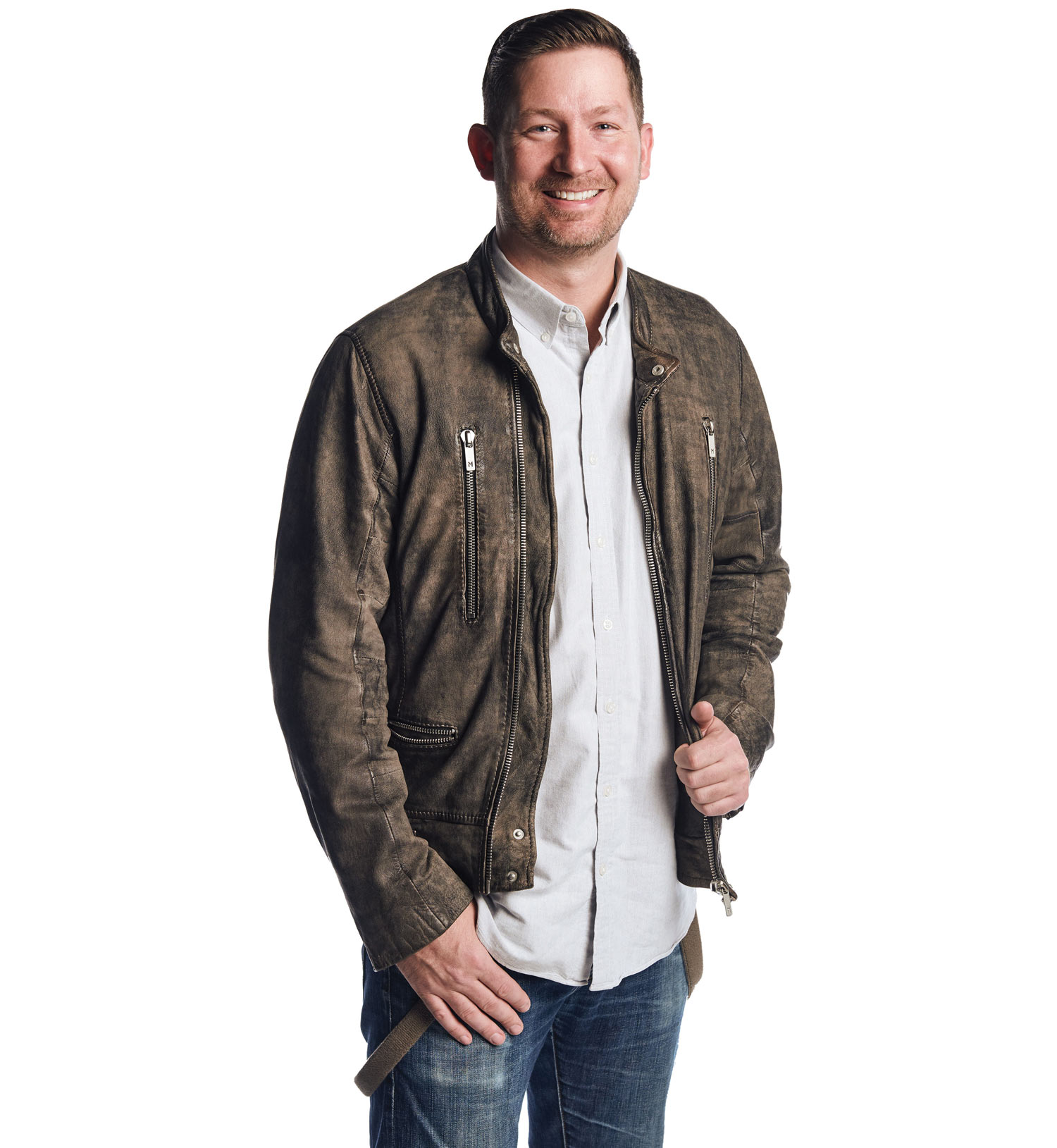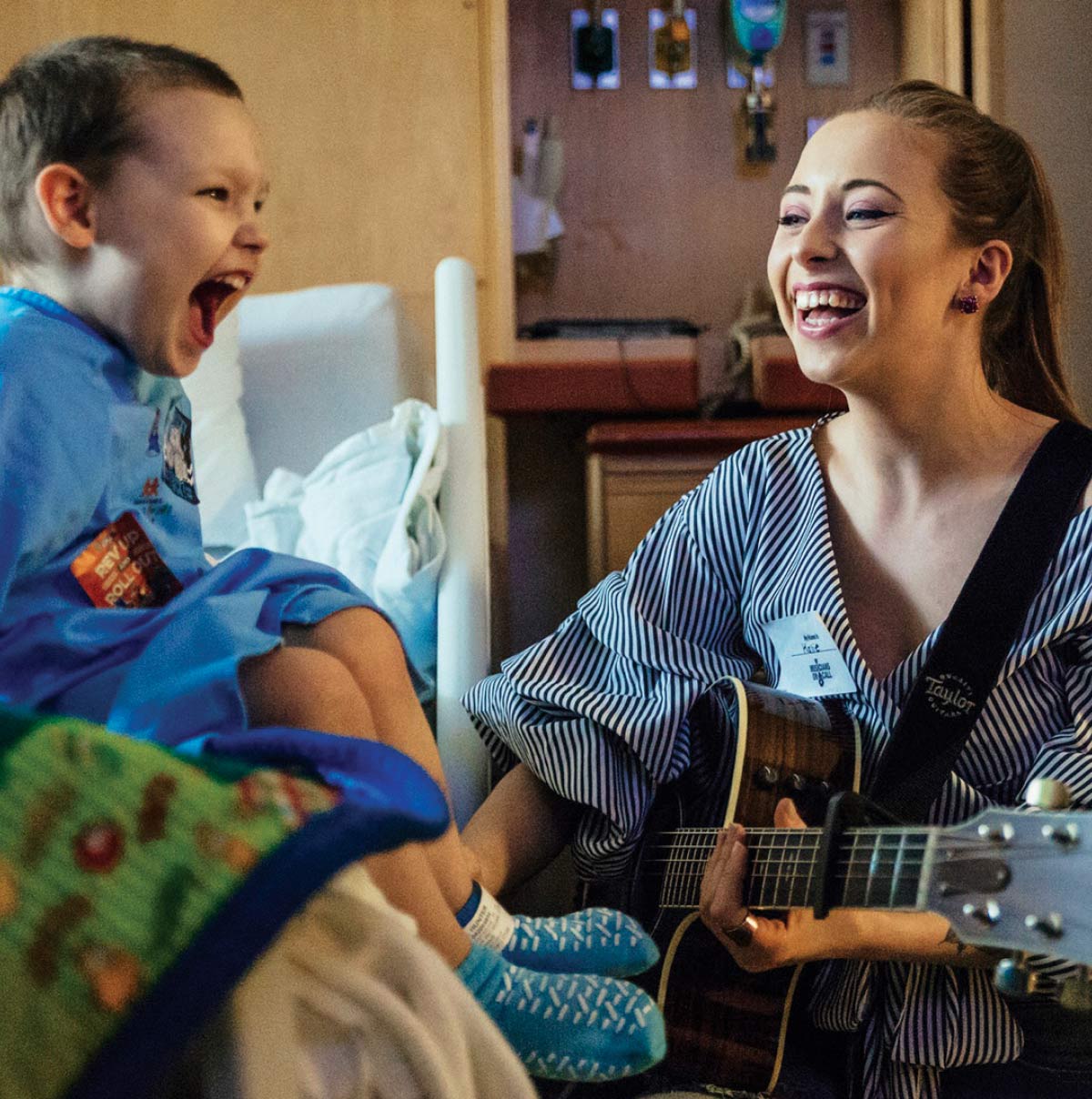

n Oct. 1, a gunman opened fire on a crowd of people attending a country music festival in Las Vegas, killing 58 and injuring 851 people. It was the deadliest mass shooting committed by an individual in U.S. history. When Pete Griffin ’00 heard the horrific news, he knew that he had to respond. One week after the tragedy, he put together a group of musicians to visit survivors of the shooting in the hospital through Musicians On Call (MOC), the nonprofit for which he serves as president. The musicians — two of whom had been performers in the Route 91 Harvest music festival where the shooting occurred — shared both country songs and tears with the victims, their families and their caregivers in an emotional series of live, in-room concerts.
“It was by far one of the most powerful things I’ve ever seen in terms of music healing,” says Griffin. “These were people who were all music lovers, which was why they were at a music festival. But the last time they’d heard music, something terrible happened. So I think having the musicians play was really powerful for the patients and families because it brought them back to why they love music.”
Musicians On Call is responsible for many such profound and cathartic moments. The Nashville- based organization was founded in 1999 by music and entertainment entrepreneurs Michael Solomon and Vivek Tiwary after both lost loved ones who passed away after long hospital stays. Solomon later helped organize a concert for the hospital featuring trumpet legend Wynton Marsalis, but realized afterward that some patients had been too sick to come to the common room and watch. He and Tiwary set about arranging private, in-room concerts, and were blown away by what they witnessed. Nearly two decades later, the organization has brought live music to the bedsides of more than 600,000 children and adults, including many veterans, in 26 cities. Volunteer performers have ranged from local musicians to such superstars as Bruce Springsteen, Kelly Clarkson, Katy Perry and Pharrell Williams.
“It’s one of the most incredible things to see how everyone can transform when a musician comes in to play a song that brings back a memory or allows a patient to detach for a little bit,” says Griffin. “I’ve seen things in the hospitals that are hard to explain. There have been patients who are nonresponsive, where their families say, ‘Oh you don’t have to play; it’s not like they can hear you or anything.’ And the musician will say, ‘Well, if you don’t mind I’ll play a song anyway.’ And they start playing, and all of a sudden you start seeing a toe tap from the patient, and the family is sitting there in tears saying, ‘Oh my gosh. Don’t stop.’ ”

Kelli Bruno ’13, who manages MOC’s national music programs, majored in music and film/media studies at Bucknell. She sings and plays piano, violin, guitar, handbells and ukulele, and also volunteers as a musician for the organization at least once a month.
“I love helping people, so I feel really lucky to be involved,” she says. “Thanks to Pete, it’s a really great work environment, and we’re all superpassionate about the mission,” she says.
“Passion” is a word that frequently comes up when musicians talk about their experiences with MOC. Kaitlyn Hickey, a 28-year-old singer currently studying piano at Hunter College in New York City, volunteers for Musicians on Call several times a week and credits the organization with giving her a sense of purpose. “It’s changed my entire outlook on what I should be doing and how I should be doing it,” she says.
When she heard about MOC in her early 20s, she’d been going to — and getting rejected from — a lot of musical-theatre auditions. “The first time I volunteered, I realized that music isn’t supposed to be me trying to impress people; it’s supposed to be creating the most beautiful sound that I can in this moment,” says Hickey.
Now, she’s participated in more than 75 MOC programs, and says, “I’ve never not had a really amazing, magical experience in a program.” Sometimes, that’s meant crying alongside patients or their relatives while performing in the palliative-care unit. Another time, it meant playing her favorite Luther Vandross song, “Never Too Much,” for a couple who started dancing, then finding out afterward that it was their wedding song. “I’ve gotten just as much — probably more — out of volunteering than what I’ve given,” says Hickey.
Griffin, for his part, says he enjoys “messing around” with drums and guitar, but jokes, “I don’t play music in hospitals, because we’re trying to make people’s days better, not worse.”
Keeping the organization running smoothly is where his talents lie. He’s especially proud that, after having thrown together that initial ad hoc trip to Las Vegas, MOC has now formally developed its first program in the city to make musician visits a regular occurrence. He’s also helping MOC build technology that will enable it to connect more hospitals with more musicians, more efficiently, and in a greater number of cities. It’s a need that arises from too much success: At present, demand for MOC’s programs far outstrips what it can provide.
“The interesting thing is that when the organization started it was just kind of a nice thing to do to break up the monotony of the hospital day,” says Griffin. However, now the field of music therapy has taken off, and research has suggested that music helps with pain management, helps lower stress levels and blood pressure, and brings other healing benefits to patients, according to Griffin.
“At the beginning, we were trying to convince hospitals to let us in, and now we’re just trying to keep up with the number of hospitals that want our programs,” says Griffin. “Obviously we are not doctors giving medicine or scientists curing diseases, but at the end of the day the happiness we are bringing these folks is part of the healing process. It’s pretty tangible. You can see a room transform in just a couple minutes, and that’s a pretty powerful thing.”